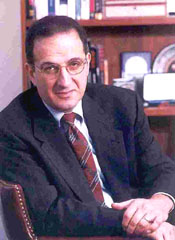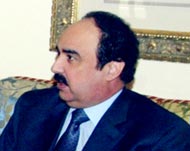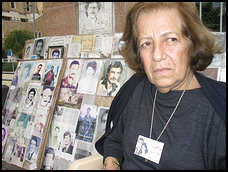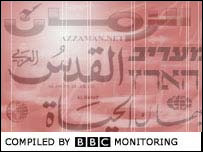 by James Zogby, (Tuesday January 03 2006)
by James Zogby, (Tuesday January 03 2006) "Despite regional and domestic concerns specific to their countries, Saudis and Lebanese are more optimistic about their futures, more satisfied with their present circumstances, more focused on specific problems that must be solved, and more strongly identified with their countries..."
Significant changes are taking place in public opinion in Saudi Arabia and Lebanon. Despite regional and domestic concerns specific to their countries, Saudis and Lebanese are more optimistic about their futures, more satisfied with their present circumstances, more focused on specific problems that must be solved, and more strongly identified with their countries than when we last polled in 2002. These are some of the findings of a Zogby International poll, conducted during the last half of October 2005. It was sponsored, in part, by the Young Arab Leaders organization, and the Arab American Institute. In an earlier column, I reported the poll
 Beirut - Syrian Brigadier General Rustom Ghazaleh, who has been implicated in the murder of a former Lebanese Premier Rafik Hariri, said Tuesday he was ready to resign if asked by Syrian President Bashar al Assad. 'If the leadership asks me to die a martyr, I am ready,' Ghazaleh, the former head of Syrian military intelligence in Lebanon, told the television news channel al Jazeera in a broadcast monitored in Beirut.
Beirut - Syrian Brigadier General Rustom Ghazaleh, who has been implicated in the murder of a former Lebanese Premier Rafik Hariri, said Tuesday he was ready to resign if asked by Syrian President Bashar al Assad. 'If the leadership asks me to die a martyr, I am ready,' Ghazaleh, the former head of Syrian military intelligence in Lebanon, told the television news channel al Jazeera in a broadcast monitored in Beirut.
'And if they ask me to resign, I am also ready,' he added in the comments to al Jazeera in the interview in Damascus. Ghazaleh denied accusations of corruption, including charges last week by Syrian former vice president Abdel Halim Khaddam that Ghazaleh took 35 million dollars from Lebanon's Al Madina bank which collapsed two years ago. 'These accusations are all baseless ... It is part of the unjust campaign against Syria,' he said. 'I am ready...all my relatives are ready, to disclose our financial statements, and if they find any Syrian dime in any country, let them disclose it,' he said.
 By Anthony Shadid, Washington Post Foreign Service Monday, January 2, 2006; BEIRUT -- On this morning, as on every morning since Oct. 17, 1985, Audette Salem cleaned the rooms of her son and daughter. She left his razor, toothbrush and comb as they were on the day her children were abducted from the streets of Beirut during Lebanon's civil war. She fiddled with her daughter's makeup and straightened her bed. She dusted the three guitars, the papers still on their desks and the pack that holds a 20-year-old cigarette, the artifacts of two lives interrupted.
By Anthony Shadid, Washington Post Foreign Service Monday, January 2, 2006; BEIRUT -- On this morning, as on every morning since Oct. 17, 1985, Audette Salem cleaned the rooms of her son and daughter. She left his razor, toothbrush and comb as they were on the day her children were abducted from the streets of Beirut during Lebanon's civil war. She fiddled with her daughter's makeup and straightened her bed. She dusted the three guitars, the papers still on their desks and the pack that holds a 20-year-old cigarette, the artifacts of two lives interrupted.
Everything is there as they left it," she said. "I haven't changed a thing, nothing at all. It's all still there."At 70, quiet but determined, Salem is a woman who clings to memories in a country that prefers to forget.In the heart of downtown Beirut, ravaged by a brutal 15-year civil war, then rebuilt into a graceful, if somewhat soulless, urban hub, Salem joins other women every day in a protest demanding to know the fate of their children. Many believe they languish in jails in neighboring Syria. Others are not sure. Behind them, their children's faces stare from pictures tacked to billboards, blank faces with generation-old haircuts, the dates of their disappearances reading like a war memorial yet to be built.
 The media in Lebanon and the Middle East has been quick to react to accusations by the exiled former Syrian vice-president Abdul Halim Khaddam implicating President Bashar al-Assad in the murder of the former Lebanese Prime Minister Rafik Hariri.In Lebanon, some commentators class him as a traitor to his country while a leading anti-Syrian politician says the allegations prove Damascus was lying about its role in Mr Hariri's death.A pan-Arab paper believes his allegations confirm a UN report by German prosecutor Detlev Mehlis which implicates Syrian intelligence in the killing.
The media in Lebanon and the Middle East has been quick to react to accusations by the exiled former Syrian vice-president Abdul Halim Khaddam implicating President Bashar al-Assad in the murder of the former Lebanese Prime Minister Rafik Hariri.In Lebanon, some commentators class him as a traitor to his country while a leading anti-Syrian politician says the allegations prove Damascus was lying about its role in Mr Hariri's death.A pan-Arab paper believes his allegations confirm a UN report by German prosecutor Detlev Mehlis which implicates Syrian intelligence in the killing.
In neighbouring Israel, a longstanding enemy of Syria, commentators are split over the ramifications for Damascus.In Syria itself, the official media has published numerous attacks against Mr Khaddam, many of which accuse him of dishonesty and malfeasance.
Khazen History


Historical Feature:
Churches and Monasteries of the Khazen family

St. Anthony of Padua Church in Ballouneh
Mar Abda Church in Bakaatit Kanaan
Saint Michael Church in Bkaatouta
Saint Therese Church in Qolayaat
Saint Simeon Stylites (مار سمعان العامودي) Church In Ajaltoun
Virgin Mary Church (سيدة المعونات) in Sheilé
Assumption of Mary Church in Ballouneh
1 - The sword of the Maronite Prince
2 - LES KHAZEN CONSULS DE FRANCE
3 - LES MARONITES & LES KHAZEN
4 - LES MAAN & LES KHAZEN
5 - ORIGINE DE LA FAMILLE
Population Movements to Keserwan - The Khazens and The Maans
ما جاء عن الثورة في المقاطعة الكسروانية
ثورة أهالي كسروان على المشايخ الخوازنة وأسبابها
Origins of the "Prince of Maronite" Title
Growing diversity: the Khazin sheiks and the clergy in the first decades of the 18th century
Historical Members:
Barbar Beik El Khazen [English]
Patriach Toubia Kaiss El Khazen(Biography & Life Part1 Part2) (Arabic)
Patriach Youssef Dargham El Khazen (Cont'd)
Cheikh Bishara Jafal El Khazen
Patriarch Youssef Raji El Khazen
The Martyrs Cheikh Philippe & Cheikh Farid El Khazen
Cheikh Nawfal El Khazen (Consul De France)
Cheikh Hossun El Khazen (Consul De France)
Cheikh Abou-Nawfal El Khazen (Consul De France)
Cheikh Francis Abee Nader & his son Yousef
Cheikh Abou-Kanso El Khazen (Consul De France)
Cheikh Abou Nader El Khazen
Cheikh Chafic El Khazen
Cheikh Keserwan El Khazen
Cheikh Serhal El Khazen [English]
Cheikh Rafiq El Khazen [English]
Cheikh Hanna El Khazen
Cheikha Arzi El Khazen
Marie El Khazen